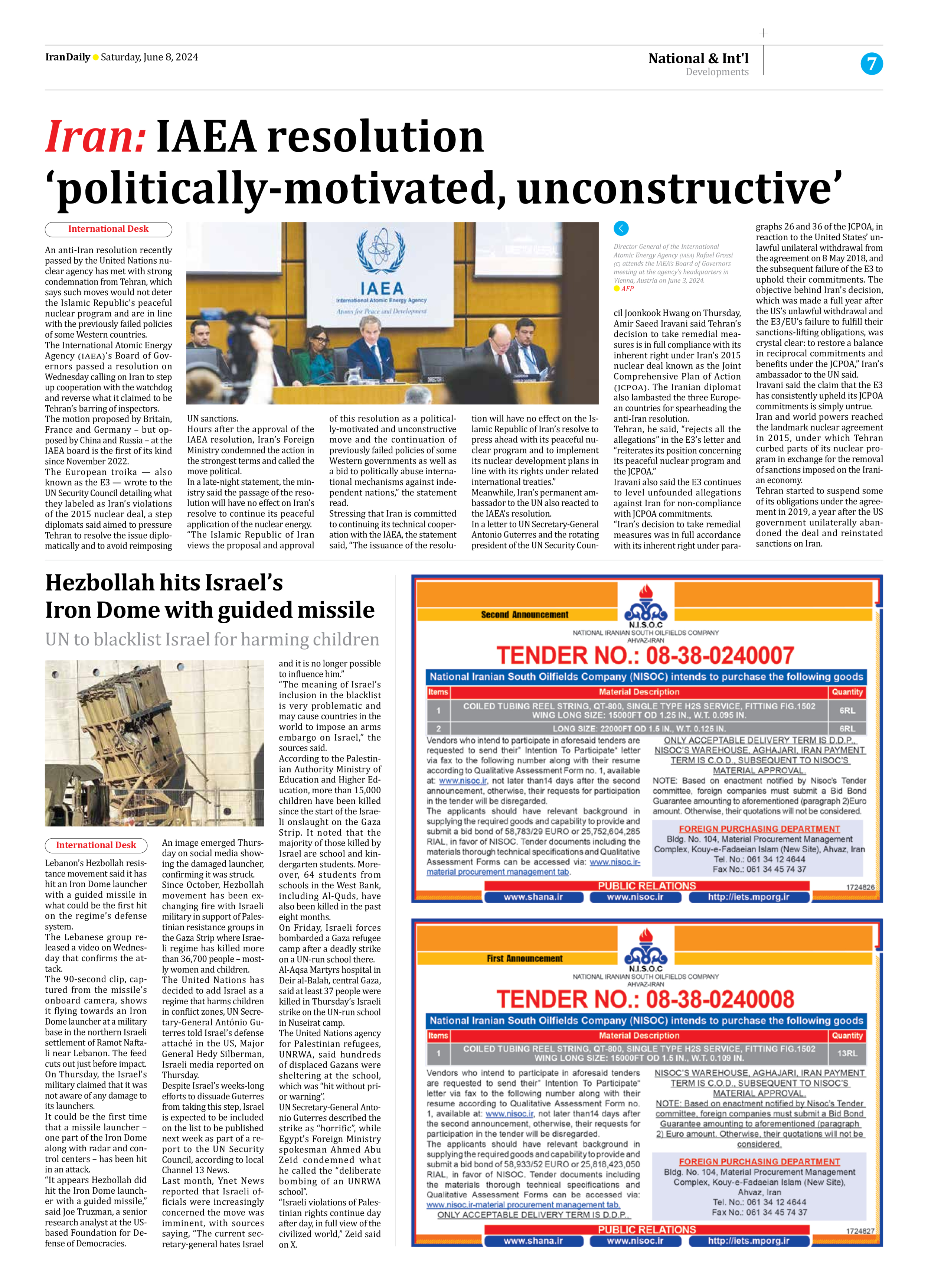
Copy in clipboard...
Iran: IAEA resolution ‘politically-motivated, unconstructive’
The International Atomic Energy Agency (IAEA)’s Board of Governors passed a resolution on Wednesday calling on Iran to step up cooperation with the watchdog and reverse what it claimed to be Tehran’s barring of inspectors.
The motion proposed by Britain, France and Germany – but opposed by China and Russia – at the IAEA board is the first of its kind since November 2022.
The European troika — also known as the E3 — wrote to the UN Security Council detailing what they labeled as Iran’s violations of the 2015 nuclear deal, a step diplomats said aimed to pressure Tehran to resolve the issue diplomatically and to avoid reimposing UN sanctions.
Hours after the approval of the IAEA resolution, Iran’s Foreign Ministry condemned the action in the strongest terms and called the move political.
In a late-night statement, the ministry said the passage of the resolution will have no effect on Iran’s resolve to continue its peaceful application of the nuclear energy.
“The Islamic Republic of Iran views the proposal and approval of this resolution as a politically-motivated and unconstructive move and the continuation of previously failed policies of some Western governments as well as a bid to politically abuse international mechanisms against independent nations,” the statement read.
Stressing that Iran is committed to continuing its technical cooperation with the IAEA, the statement said, “The issuance of the resolution will have no effect on the Islamic Republic of Iran’s resolve to press ahead with its peaceful nuclear program and to implement its nuclear development plans in line with its rights under related international treaties.”
Meanwhile, Iran’s permanent ambassador to the UN also reacted to the IAEA’s resolution.
In a letter to UN Secretary-General Antonio Guterres and the rotating president of the UN Security Council Joonkook Hwang on Thursday, Amir Saeed Iravani said Tehran’s decision to take remedial measures is in full compliance with its inherent right under Iran’s 2015 nuclear deal known as the Joint Comprehensive Plan of Action (JCPOA). The Iranian diplomat also lambasted the three European countries for spearheading the anti-Iran resolution.
Tehran, he said, “rejects all the allegations” in the E3’s letter and “reiterates its position concerning its peaceful nuclear program and the JCPOA.”
Iravani also said the E3 continues to level unfounded allegations against Iran for non-compliance with JCPOA commitments.
“Iran’s decision to take remedial measures was in full accordance with its inherent right under paragraphs 26 and 36 of the JCPOA, in reaction to the United States’ unlawful unilateral withdrawal from the agreement on 8 May 2018, and the subsequent failure of the E3 to uphold their commitments. The objective behind Iran’s decision, which was made a full year after the US’s unlawful withdrawal and the E3/EU’s failure to fulfill their sanctions-lifting obligations, was crystal clear: to restore a balance in reciprocal commitments and benefits under the JCPOA,” Iran’s ambassador to the UN said.
Iravani said the claim that the E3 has consistently upheld its JCPOA commitments is simply untrue.
Iran and world powers reached the landmark nuclear agreement in 2015, under which Tehran curbed parts of its nuclear program in exchange for the removal of sanctions imposed on the Iranian economy.
Tehran started to suspend some of its obligations under the agreement in 2019, a year after the US government unilaterally abandoned the deal and reinstated sanctions on Iran.







